|
|
|
Sort Order |
|
|
|
Items / Page
|
|
|
|
|
|
|
| Srl | Item |
| 1 |
ID:
127497


|
|
|
|
|
| Publication |
2013.
|
| Summary/Abstract |
CELEBRATIONS took place in August 2013 in the Czech Republic and Russia to mark 200 years since the victory in the Battle of Kulm by the allied forces of Russia, Austria and Prussia over Napoleon's forces.
In order to put in perspective this seemingly local and almost forgotten battle in 1813, where valiant Russian soldiers played a decisive part, let us make a brief historical digression to the now distant period that preceded the fighting at Kulm on 29-30 August 1813 and at Leipzig on October 16-18, 1813.
|
|
|
|
|
|
|
|
|
|
|
|
|
|
|
|
| 2 |
ID:
191043
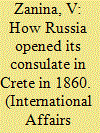

|
|
|
|
|
| Summary/Abstract |
RUSSIA has done a lot to help Greece become an independent state, providing decisive and freely given aid to the people of Greece to save Greek lives and protect Greek interests over the centuries. This is a fact of history. Russian diplomats who served in the Greek provinces of the Ottoman Empire spared no effort to support and encourage Orthodox Christian Greeks. These diplomats did so not only in their line of duty but out of their own convictions and sympathy toward coreligionists. The work of the Russian consulate that opened in Crete in 1860 is one the best examples of the above. Russian diplomats saved Cretan Christians from extermination, prevented their conversion to Catholicism, and thus preserved the canons of Orthodoxy in Crete...
|
|
|
|
|
|
|
|
|
|
|
|
|
|
|
|
| 3 |
ID:
151267
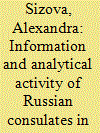

|
|
|
|
|
| Summary/Abstract |
The author examines specific features of the activity of Russian Empire consulates in Mongolia which analyzed the political and military situation at the time. The Russian Foreign Ministry offices' work is analyzed in observing China's policy toward Outer Mongolia and neighboring regions. The article also dwells on Russian diplomatic activity to diminish Japan's influence in Mongolia and discloses its mediatory role in solving the "Tibet problem."
|
|
|
|
|
|
|
|
|
|
|
|
|
|
|
|
| 4 |
ID:
101680
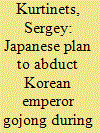

|
|
|
|
|
| Publication |
2010.
|
| Summary/Abstract |
On the basis of the documents which the author has found at the State Archives in Vienna and the Archives of Foreign Policy of the Russian Empire at the Foreign Ministry of Russia, the Hungarian scholar of Korean history comes to the conclusion that the energetic actions of Russian diplomats in 1905 thwarted the Japanese plan to transfer Emperor Gojong of Korea to Japan and thus speed up the annexation of Korea by Japan.
|
|
|
|
|
|
|
|
|
|
|
|
|
|
|
|
| 5 |
ID:
131840
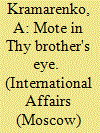

|
|
|
|
|
| Publication |
2014.
|
| Summary/Abstract |
Mr. Sestanovich makes clear his reason for this prediction, i.e. he doesn't like Russian diplomacy's success in turning things around in international community's response to the Syrian crisis. He does omit, however, a few facts of real consequence. Syria's chemical disarmament under UNSC Resolution 2118, indeed, represents a common denominator for all, including Russia and the U.S. But we didn't impose it on our partners. What we did is called providing leadership when our partners were confronted with impossible dilemmas. Britain resolved its own on August 29 through a vote of Parliament. The Obama administration faced a similar prospect in Congress. What is important is that the legislators of both countries reflected the prevailing mood of their public opinion. What is more, it was British Parliament that by its decision was the first to encourage President Obama to go to Congress on Syria, which ultimately led to UNSC unity.
|
|
|
|
|
|
|
|
|
|
|
|
|
|
|
|
| 6 |
ID:
157270
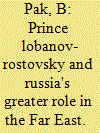

|
|
|
|
|
| Summary/Abstract |
ONE OF THE PLACES OF HONOR among the outstanding statesmen of Russia who served as its foreign ministers belongs to Prince Alexey Lobanov-Rostovsky.* At 35, he was appointed Envoy Extraordinary and Minister Plenipotentiary in Constantinople (1859-1863); later, he returned to the Ottoman Empire as Ambassador Extraordinary and Plenipotentiary (1878-1879) and served in the same rank in London (1879-1882) and Vienna (1882-1895). On February 26 (March 10), 1895, Nicholas II made him foreign minister.
|
|
|
|
|
|
|
|
|
|
|
|
|
|
|
|
| 7 |
ID:
100320
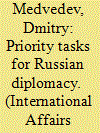

|
|
|
|
|
| Publication |
2010.
|
| Summary/Abstract |
In the two years that have passed since our last meeting, the world has changed significantly, although we always use that phrase - it's a truism of sorts. Still, it is absolutely accurate when applied to the last two years.
These changes include the August 2008 events in the Caucasus, the global financial crisis shortly after that, and our decision to begin modernizing Russia's economy and changing its political system.
|
|
|
|
|
|
|
|
|
|
|
|
|
|
|
|
| 8 |
ID:
098135
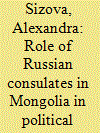

|
|
|
|
|
| Publication |
2010.
|
| Summary/Abstract |
This article is devoted to the political dimension of Russian consulates' activities in Mongolia between 1861 and 1917, and to their role in implementing the Russian "Far Eastern strategy." The imperial consulates made a significant contribution to the resolution of the "Mongolian problem" as an efficient mechanism of Russia's mediation in Mongolia's efforts to achieve autonomy, and in the "Kobdo" and "Altai" issues in the early 20th century. The article also analyzes the consulates' work to reinforce Russia's positions in Outer Mongolia and to maintain the balance of forces in the competitive international regional subsystem of the period.
|
|
|
|
|
|
|
|
|
|
|
|
|
|
|
|
| 9 |
ID:
101861
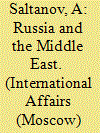

|
|
|
| 10 |
ID:
117359
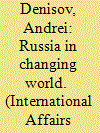

|
|
|
|
|
| Publication |
2012.
|
| Summary/Abstract |
First Deputy Foreign Minister of the Russian Federation
THE TITLE OF THIS ARTICLE encapsulates the motto of an upcoming meeting of ambassadors and permanent representatives of the Russian Federation to international organizations. Traditionally, such meetings are held once per two years. They constitute an important ingredient of politico-diplomatic activities by the Russian Foreign Ministry and its missions abroad, allow for comprehensive analysis of the international situation and help to pinpoint the goals of Russian diplomacy in specific areas.
|
|
|
|
|
|
|
|
|
|
|
|
|
|
|
|
| 11 |
ID:
111952
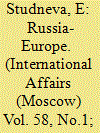

|
|
|
|
|
| Publication |
2012.
|
| Summary/Abstract |
"IT WILL LARGELY DEPEND upon the professionalism of journalists and their respect of ethical principles whether mass media will help to consolidate peace and find balanced and mutually acceptable ways of overcoming crisis situations or, in contrast, incite people to confrontation and violence." These were the words of Russian Foreign Minister Sergei Lavrov in his opening address at the international conference "Russia-Europe: Topical Issues in Contemporary International Journalism" that took place in Paris on November 24-25, 2011.
Lavrov's address expresses the gist of the discussion that took place at the conference among heads of leading Russian and international media, directors of European institutes in the humanities, Russian and European government officials, and well-known journalists from international media.
|
|
|
|
|
|
|
|
|
|
|
|
|
|
|
|
| 12 |
ID:
155350
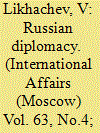

|
|
|
|
|
| Summary/Abstract |
MODERN DIPLOMACY is a major factor in Russia's effective development and positioning in the 21st century. Russia clearly understands the problems of the world order and the critical state of many of its aspects in geopolitical terms, as well as the methodology of global governance based on the fundamental principles of international law and the UN Charter. This is evidenced by the Foreign Policy Concept of the Russian Federation that the Russian president signed on November 30, 2016. It not only reflects Russia's national interests and the priorities of its foreign policy activity to ensure these interests, but also sets the task of harmonizing them with the positive trends and needs of the international community as such. Therefore, the concept documents the country's integral function and its status as an organic and active part of the world of the 21st century.
|
|
|
|
|
|
|
|
|
|
|
|
|
|
|
|
| 13 |
ID:
117379
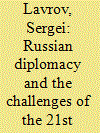

|
|
|
|
|
| Publication |
2012.
|
| Summary/Abstract |
S. Lavrov: There are a few basic parameters for evaluation of the current international situation that are generally accepted by all who are trying to seriously comprehend the world tendencies. First, we are currently experiencing a period of transition, which essentially could mean another era change. President Vladimir Putin gave special emphasis to this thesis in his speech at the Russian ambassadors and permanent representatives meeting in July. Profound changes are underway in the international landscape, attended by disturbances in the economy, politics, and international relations in general.
Second, the historical processes continue to gather speed. We see it also in the acceleration of the deep-going, as is customary to say, tectonic shifts, in the global redistribution of power and influence and in the rapid developments in the Middle East and North Africa, as well as in some other parts of the world.
Thirdly, it is already becoming obvious that in the 21st century international relations are moving in the direction of becoming a polycentric system. Hence no single state, however powerful, will be able to determine the world's fate, nor will the opposing military-political blocs, as was the case during the Cold War, or even a narrow concert of "chosen" countries and centers of global influence. The point is to build a just, democratic and stable, ideally - a self-regulating system of international relations.
|
|
|
|
|
|
|
|
|
|
|
|
|
|
|
|
| 14 |
ID:
112825
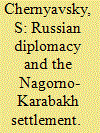

|
|
|
|
|
| Publication |
2012.
|
| Summary/Abstract |
THE CONFLICT SURROUNDING Nagorno-Karabakh and the adventurous acts of Georgia's leadership ratchet up tensions in the North Caucasus thus hampering war on terrorism and holding up economic development all over the Caucasus. This makes peaceful settlement of territorial and ethno-political problems of the former Soviet republics in Transcaucasia one of the important priorities for Russian diplomacy.
Attempts are being made as before in this region, which is home to a unique community of tens of millions of people, to divide it into spheres of influence. In the meantime, the common responsibility and overriding task of the states in the region (including Russia) consist in getting the situation in the Caucasus under close joint control, extinguishing the conflicts and dealing with their aftereffects. The road to prosperity of its peoples lies through development and broader cooperation, reliance on their collective experience in political, economic, scientific and technological interaction, the common cultural legacy and the common history of Russia and of other people of the Caucasus.
|
|
|
|
|
|
|
|
|
|
|
|
|
|
|
|
| 15 |
ID:
163638
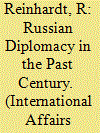

|
|
|
| 16 |
ID:
160598
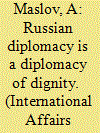

|
|
|
|
|
| Summary/Abstract |
International Affairs: In 2018, we will mark the 190th anniversary of Russian-Greek diplomatic relations. What is it like for Russian diplomats to work in Greece, and are there any nuances in interaction between the Russian Embassy and the Greek government?
|
|
|
|
|
|
|
|
|
|
|
|
|
|
|
|
| 17 |
ID:
165625
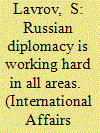

|
|
|
| 18 |
ID:
181287
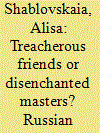

|
|
|
|
|
| Summary/Abstract |
Since the beginning of the XIXth century the relations of dependency and inter-dependency between the Iranian monarch and foreign officials became an integral part of Iranian political life. During the Iranian Constitutional Movement (1905–1911) nascent Iranian nationalism harshly condemned the Qajars as tyrants and lackeys of foreign powers. Muhammad ‘Ali Shah (r.1907–1909), the first Qajar sovereign who had to share his powers with the representative assembly, was quickly discredited by his political opponents as despot and Russian puppet, an accusation that seemed to be proved when the deposed Muhammad ‘Ali returned to Iran from his exile and launched a military campaign. This study represents an attempt to shed more light on the relations between Muhammad ‘Ali and Russian officials, especially in the context of his return campaign of 1911. Relying mostly on unpublished Russian archival sources, this paper proposes a critical assessment of Muhammad ‘Ali’s link with Russia, avoiding the habitual reductionist scheme of ‘patron-client’ relations and putting more emphasis on the role of agency in Russian foreign policy in Iran as well as the proper intentions and ambitions of the Qajar princely elite.
|
|
|
|
|
|
|
|
|
|
|
|
|
|
|
|
| 19 |
ID:
100714
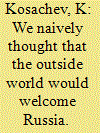

|
|
|
|
|
| Publication |
2010.
|
| Summary/Abstract |
International Affairs: Konstantin Iosifovich, after extensive and very strained negotiations, Russian President Dmitry Medvedev and U.S. President Barack Obama signed a treaty on the reduction of strategic offensive weapons. Needless to say, this is a landmark event in the history of international relations. How do you assess the signing of the new START treaty?
|
|
|
|
|
|
|
|
|
|
|
|
|
|
|
|
|
|
|
|
|